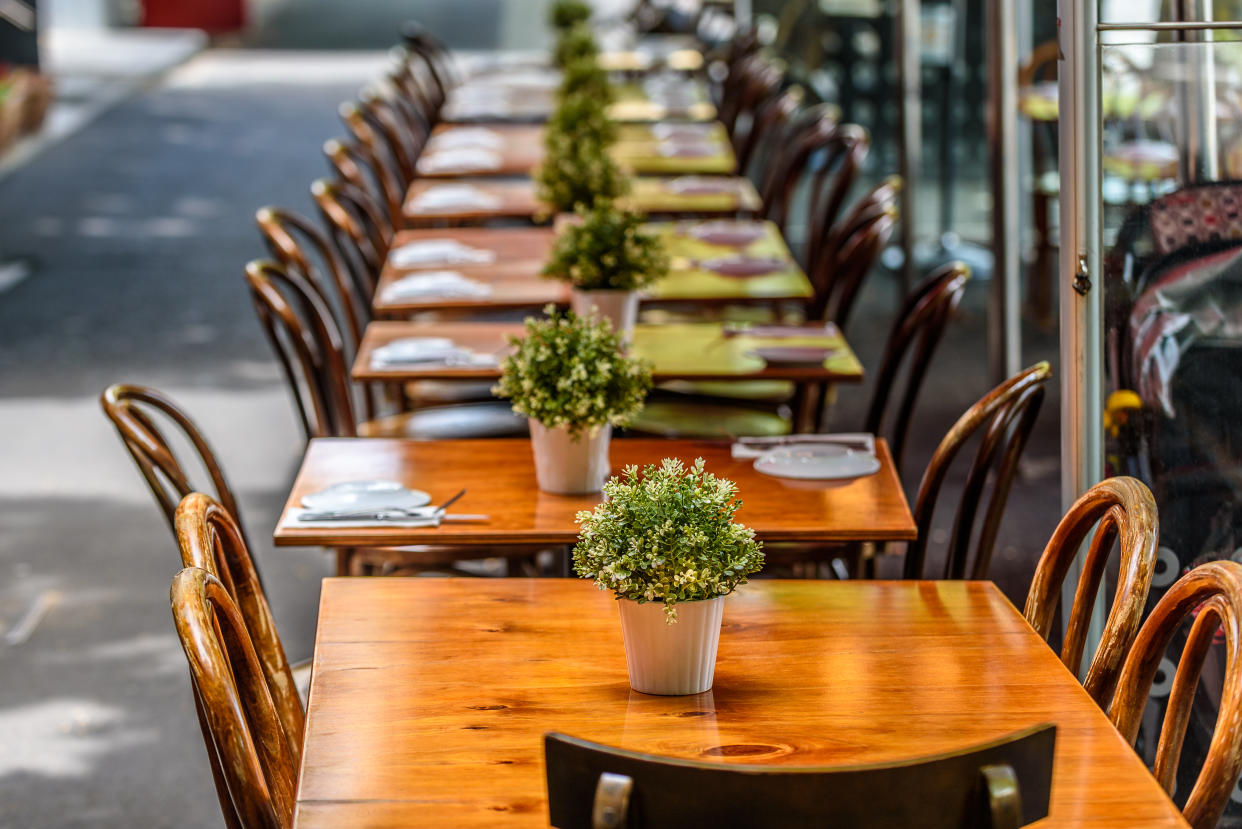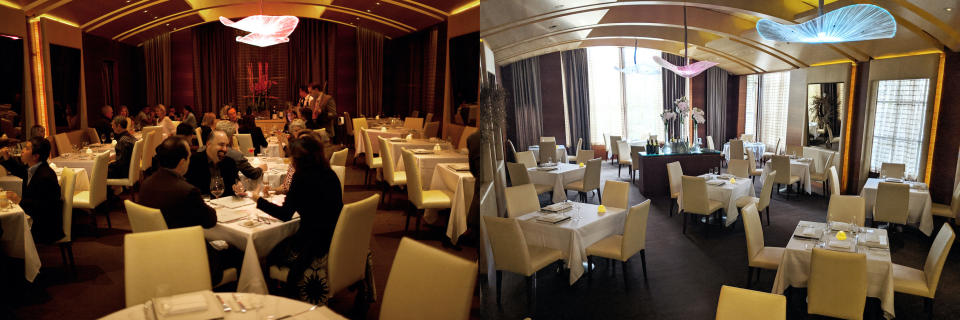Is it safe to eat in restaurants amid the coronavirus? Experts say proceed with caution

Although the U.S. Food and Drug Administration stated in February, “We are not aware of any reports at this time of human illnesses that suggest COVID-19 can be transmitted by food or food packaging,” COVID-19 is now an official pandemic, with almost 127,000 global positive cases and 1,300 in the United States. And in response, restaurants are now scrambling to improve the health and safety of customers and staff.
At the 12-time Michelin-starred Plumed Horse in Saratoga, Calif., management has removed 21 of its 36 dining tables to separate parties by six feet, adhering to “social distancing,” a public health tactic to slow the spread of disease. Although the World Health Organization (WHO) advises maintaining a three-foot distance from symptomatic people, according to co-owner Josh Weeks, “That wasn’t enough.”
Servers also wear gloves when interacting with guests or handling food, discarding them for a new pair each time. “I’m going through three cases of gloves per night,” Weeks tells Yahoo Lifestyle. And the establishment is paying sick workers — no questions asked — for up to 14 days, the maximum incubation period (from exposure to symptoms), according to the Centers for Disease Control and Prevention (CDC).

Sichuan Impression in California has been using infrared thermometers to take patrons’ temperatures at the door, and refusing those who balk, according to the Chinese restaurant’s January Instagram post. On Sunday, MGM Resorts International will close buffets at hotels ARIA, Bellagio, MGM Grand, Mandalay Bay, the Mirage, Luxor and Excalibur. “These changes are temporary and will be evaluated on a weekly basis,” a spokesperson tells Yahoo Lifestyle.
The Village Anchor restaurant in Kentucky, meanwhile, shared on Facebook that, in addition to spaced-out seating, employees are taking the following precautions: Tables, chairs and menus are sanitized after each use; cutlery is sealed in plastic bags; and a quirky practice of presenting checks inside paperback romance novels has been suspended. The new rules will also be implemented at its sister restaurants Le Moo and Grassa Gramma.
Restaurant investors CapitalSpring told CNBC that establishments have been advised to set timers inside kitchens reminding employees to wash hands or clean, monitoring with security cameras and spreadsheets. And Dunkin’ Donuts is “temporarily halting” the refilling of reusable cups, a company spokesperson tells Yahoo Lifestyle, “in light of the public health concerns related to the coronavirus.” Meanwhile, McDonald’s has advised franchisees to frequently sanitize “touchpoint” areas such as door handles, push plates and countertops, and provide hand sanitizer dispensers.
“The health and wellbeing of our people, our customers and our communities is our highest priority and drives our decision making,” a McDonald’s spokesperson tells Yahoo Lifestyle. “As we proactively monitor the impact of the coronavirus, we are continuously evaluating our policies to provide flexibility and reasonable accommodations. Our people are the heart and soul of the McDonald’s family and, of course, we will support them through this unique circumstance.”
And a letter from Starbucks CEO Kevin Johnson sent to Yahoo Lifestyle by the company suggested that stores could limit seating and orders through apps or use the drive-thru option.
Restaurants are giving sick pay to employees who may otherwise work when ill — at corporate-owned McDonald’s, for example, for those asked to quarantine for 14 days. And a spokesperson from Darden Restaurants, the parent company of Olive Garden and LongHorn Steakhouse, along with six other establishments, tells Yahoo Lifestyle that a plan to provide hourly workers with permanent sick-leave pay has been accelerated.
Thirty two percent of people surveyed by market research group Technomic plan to reduce their dining-out habits, but according to Donald W. Schaffner, Ph.D., Food Science Graduate Program Director at Rutgers University, the risk of contracting the illness from a restaurant visit remains low. “You’re more likely to get sick from a restaurant patron sneezing on you than from the person handling your food,” Schaffner tells Yahoo Lifestyle.
Assessing risk from a restaurant is a probability question. “If someone sneezes on your plate and you touch the wet droplet with your finger, then rub your eye, you might get sick,” he says. “But if that person touches their face and then your plate, that’s a dry transfer and the probability of contamination is lower.” Contracting the virus from a contaminated surface has not documented, noted the CDC, although the virus could live on surfaces for hours or days.
Alex Susskind, Ph.D., associate dean for academic affairs at the School of Hotel Administration at Cornell University, says that restaurants are heavy on messaging because contamination is more complex than what could happen in a highly-organized supply chain. “Contamination is harder to control because it can occur from a cook, a server or a customer,” he tells Yahoo Lifestyle. “So these variables are somewhat uncontrollable but business owners can control it with awareness.”
The experts say that taking risk-reduction measures is wise, especially for the elderly or those with chronic medical conditions. “Not all operations are created equal,” notes Susskind. “If you see unhealthy behavior in a restaurant, as a consumer, you can always leave.”
Restaurants are tightly-regulated businesses that follow federal food codes, says Larry Lynch, SVP of certification and operations at the National Restaurant Association. “What restaurants are doing now reflects the food safety training that’s already in place,” he tells Yahoo Lifestyle. “So I would argue that restaurants are the one place where you could feel good.”
For the latest news on the evolving coronavirus outbreak, follow along here. According to experts, people over 60 and those who are immunocompromised continue to be the most at risk. If you have questions, please reference the CDC and WHO’s resource guides.
Related Video: Restaurants Struggling As Coronavirus Keeps People Home
Read more from Yahoo Lifestyle:
WHO declares coronavirus a pandemic — here's what that means
How to stay positive in a negative news cycle: 'We are in this together'
Want daily pop culture news delivered to your inbox? Sign up here for Yahoo Entertainment & Lifestyle's newsletter.
